The College of Aviation has established an exceptional research infrastructure that is supported by our five departments: Aeronautical Science, Flight, Applied Aviation Sciences, Aviation Maintenance Science and the School of Graduate Studies. Our state-of-the-art research facilities are equipped with cutting-edge resources to facilitate innovative studies.
This website presents an overview of the various laboratories, equipment, facilities and their respective purposes and capabilities. We welcome collaboration opportunities and encourage you to contact us for more information or to discuss potential partnerships with our preeminent faculty and staff and our exceptional students.
Aeronautical Science
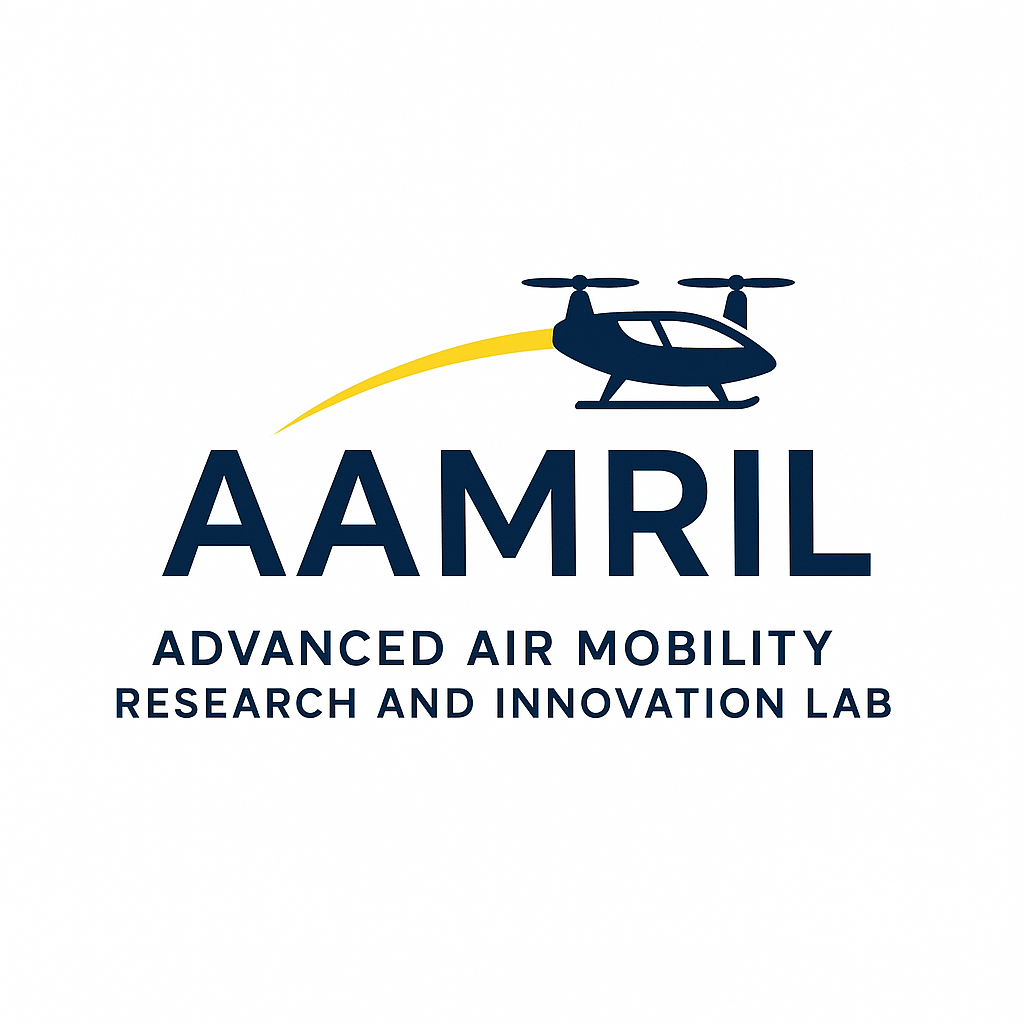
Advanced Air Mobility Research and Innovation Lab (AAMRIL)
The Advanced Air Mobility Research and Innovation Lab (AAMRIL) advances the safe, efficient, equitable, and sustainable integration of advanced air mobility (AAM) systems into future transportation networks through interdisciplinary research, systems innovation, and operational planning. AAMRIL’s focus on maturing concepts of operation addresses critical areas such as integrated airspace and traffic management, autonomy, flight safety, human factors, policy, public acceptance, and infrastructure development.
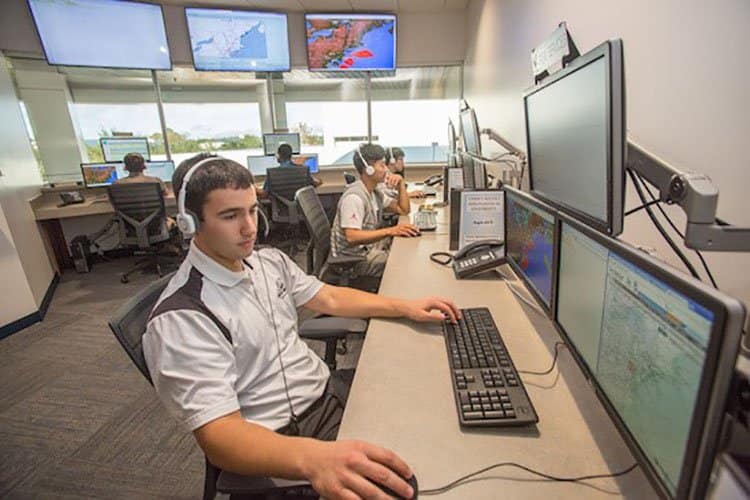
The AROC allows students to learn and practice the different functions of an airline operational command and control center. The lab is equipped with nine stations where students practice current operational policies and procedures from several disciplines, including meteorology, dispatch, aircraft performance, safety, air traffic control, and crew resource management. Students also learn to apply regulations from 14 C.F.R. Parts 61, 91, 117, 119, 121 and 135 to solve real-world problems while identifying and prioritizing air traffic conflicts within a simulated airline operational environment.
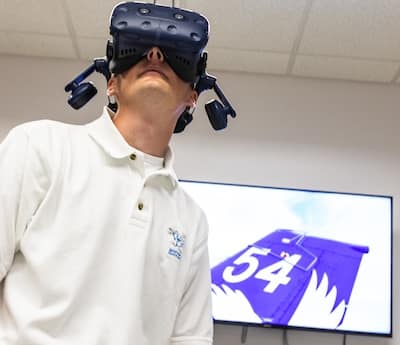
The mission of the XR Lab is to explore, develop and test immersive simulation technologies for use in the aviation and aerospace industries.
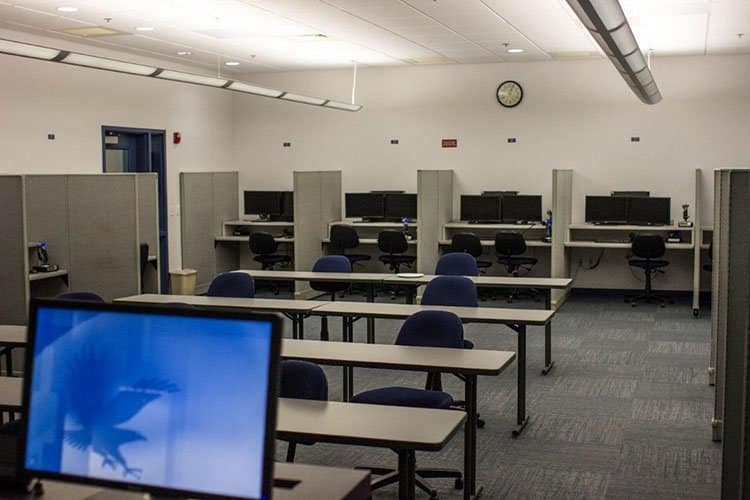
The Les Kumpula Flight Techniques and Electronic Navigation Lab has 15 crew stations equipped with programmable Control Display Units and Mode Control Panels for the Boeing 737 aircraft. These components are consistent with large transport category aircraft and are used in cooperation with the aircraft’s Flight Management System to relay information throughout the flight deck. This lab aims to introduce students to the planning and monitoring functions associated with the operation of fully automated aircraft.
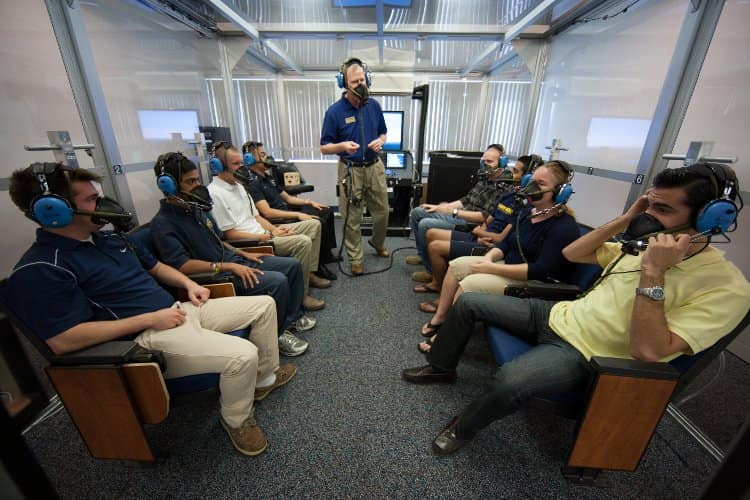
The purpose of the HAL is to conduct high altitude and hypoxia awareness training and research. The lab teaches participants how to recognize the signs and symptoms of hypoxia in themselves and fellow crew members. Participants engage in exercises consisting of cognitive thought, visual awareness, hand-eye coordination, etc., while they begin to experience symptoms of hypoxia. The HAL chamber experience provides first-hand experience of what it is like to be hypoxic. It also provides a more thorough understanding of this emergency situation and the requirement to don the oxygen mask and descend the aircraft as appropriate.
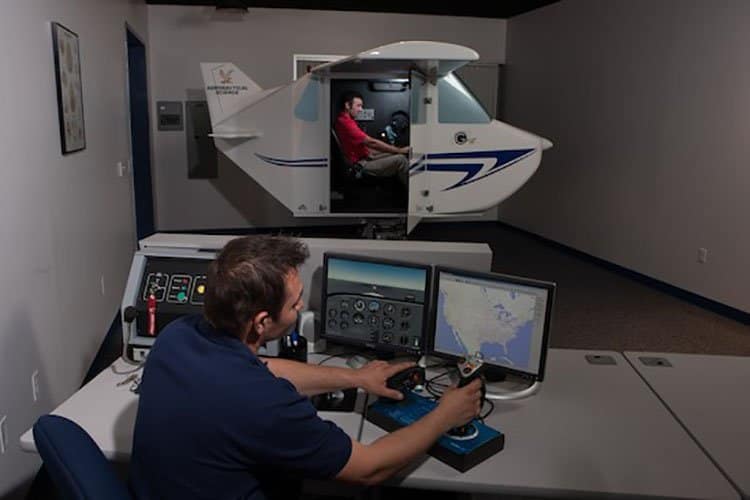
The SD Training Lab provides students the opportunity to experience visual and vestibular illusions that may occur during flight. Students gain awareness of these illusions and ways to avoid spatial disorientation. The SD Training lab prepares students to recognize an illusion when it happens during flight and to take immediate and appropriate action.
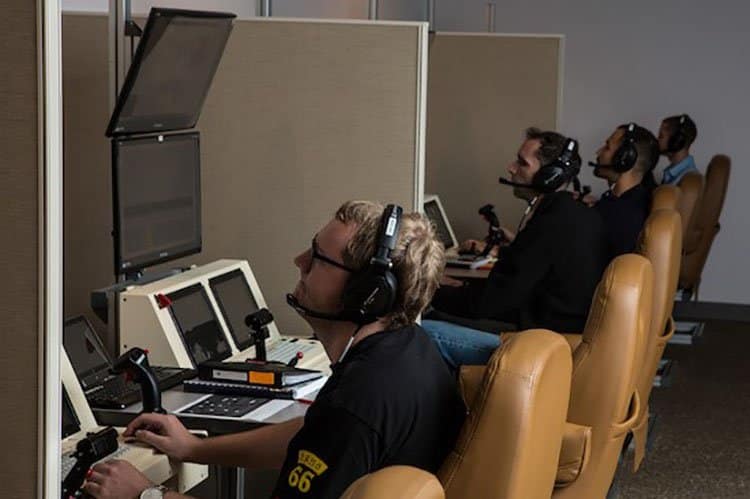
The UAS Training Lab boasts eight simulators, facilitating a seamless link between ground control station software and simulated uncrewed aircraft. This setup allows students to practice lifelike flight scenarios and emergency procedures, complete with a camera payload replicating real-world situations. The innovative Remote Split Operations feature enables students to remotely operate actual aircraft across diverse locations in the United States, conducting tasks such as search and rescue missions and cell tower inspections. The UAS Training lab offers students a comprehensive learning journey with robust flight planning tools and management resources. Furthermore, the lab equips students with practical skills and knowledge, solidifying the laboratory's role as a comprehensive uncrewed aircraft systems education hub.
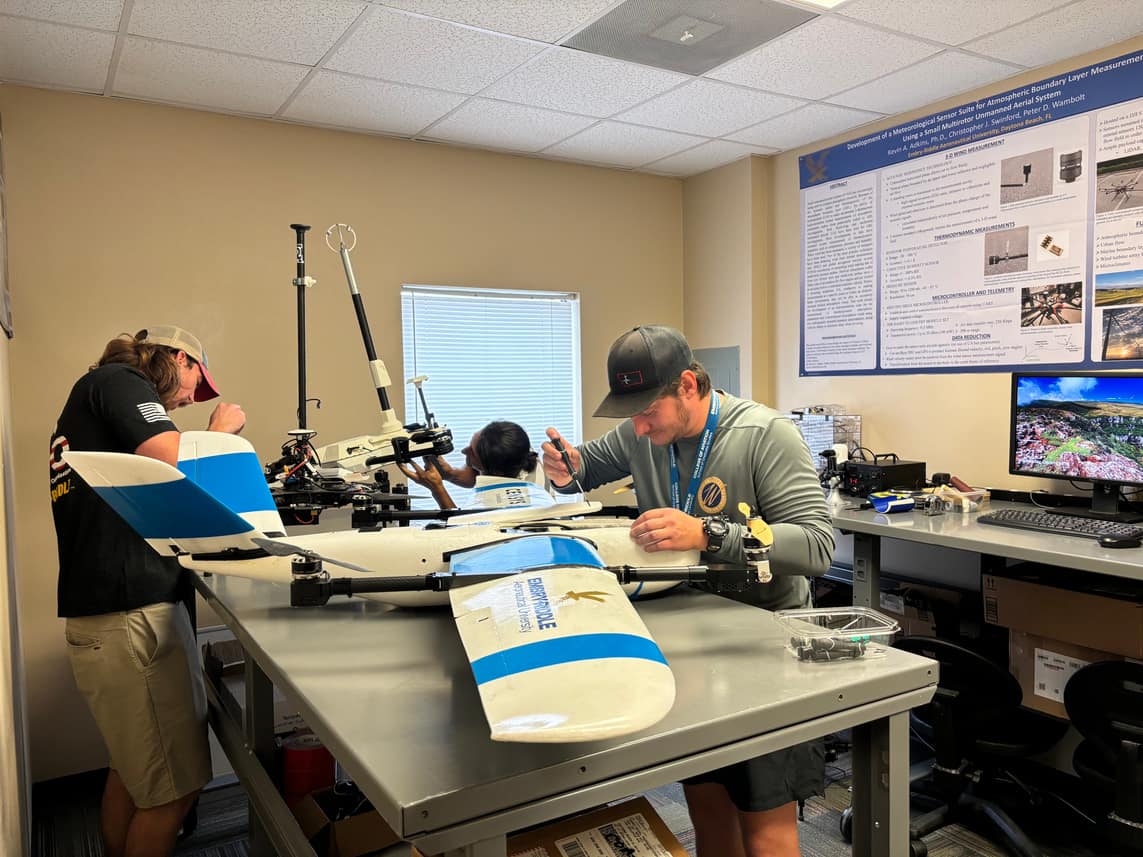
The UNVAIL research lab facilitates student exploration of the physical environment by leveraging the capabilities of uncrewed aircraft systems, commonly known as drones. Equipped with specialized instruments, these drones enable students to conduct on-demand measurements with heightened continuity and precision, covering expansive horizontal and vertical distances. This includes intermediate elevations that bridge the gap between ground-based sensors and traditional crewed aircraft operations. Specifically, the lab focuses on studying the atmospheric boundary layer, the lowest layer of the atmosphere directly affected by the Earth's surface. This layer constitutes the primary realm of interest in the majority of the lab's investigative efforts.
Warning! This rendering references a missing or unpublished data source.
Applied Aviation Sciences
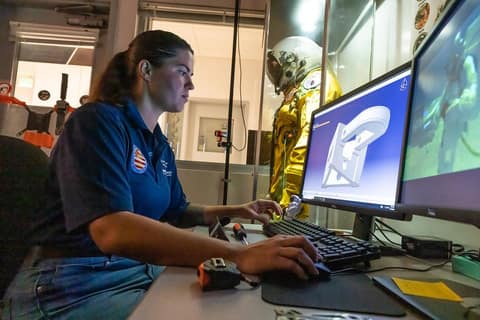
The mission of ASTRA is to conduct innovative and collaborative ground and space-based research to prepare for human exploration far from the Earth and to integrate this knowledge into the spaceflight arena while providing an education platform that supports critical thinking and creativity.
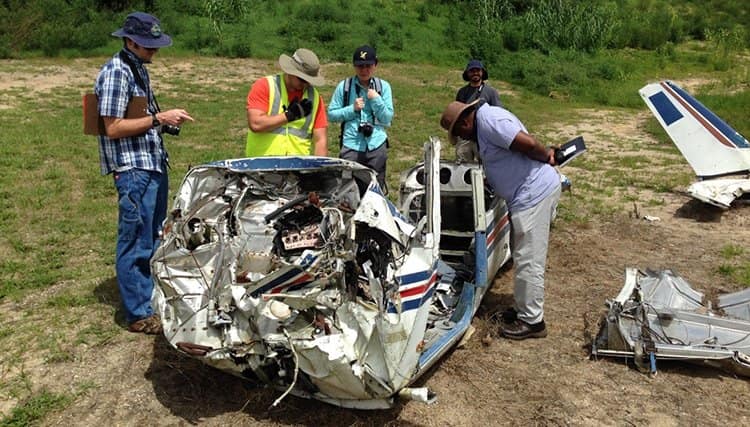
The Aerospace Forensics Lab is used in undergraduate, graduate and professional courses. Aviation Safety students gain practice in the science of aircraft accident investigation by examining fixed-wing and rotary aircraft wreckage. Visual and tactile inspections provide valuable experience that transfers directly to real-world aviation accident investigations. The lab is often featured in various news media interviews.
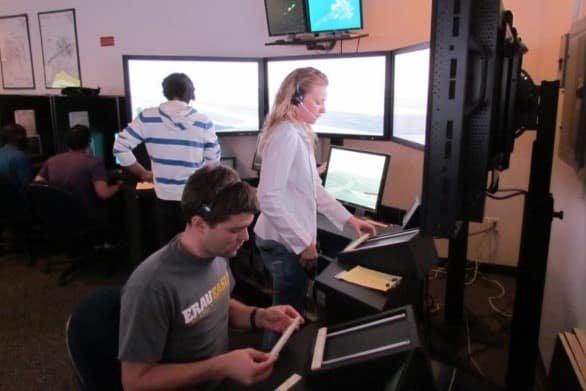
The ATC Tower Lab is a high-fidelity simulation of air traffic control in a visual flight rules tower utilizing the latest Rose Simulation GmbH technology. The lab simulates all major positions in a control tower, including local control, ground control and flight data/clearance delivery. The simulator utilizes digital voice communication, Airport Surface Detection Equipment (ASDE)-X, tower radar displays and electronic flight strips. Instructors simulate the ATC tower located at the Federal Aviation Administration Academy and the tower located on the Daytona Beach International Airport to ensure students can carry out proper ATC procedures and understand the training expectations of the FAA Academy’s technical curriculum.
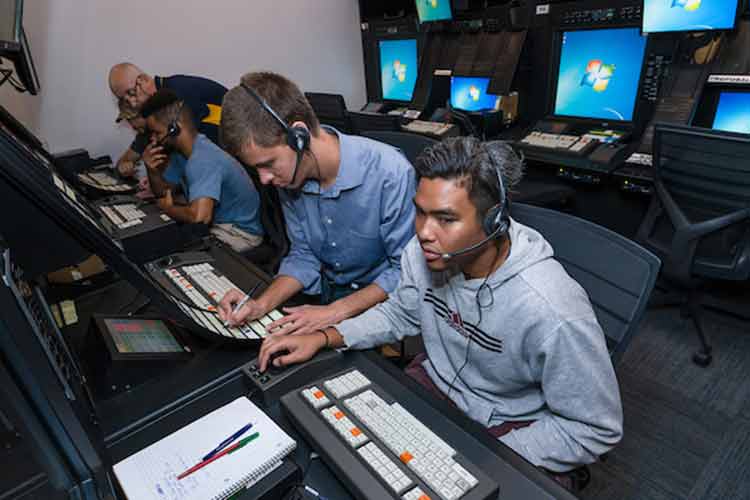
The Enroute Traffic Control Lab is a simulated real-world environment where air traffic management students learn and practice critical communications and aircraft handling skills required during the enroute phase of air traffic control. The I-SIM® ATM technology enables air traffic control training, airspace design/analysis, computer-human interface development and uncrewed aircraft system integration. The Enroute Traffic Control Lab is configured utilizing Enroute Automation Modernization with Display System Replacement consoles emulating the FAA Next Generation Transportation System.
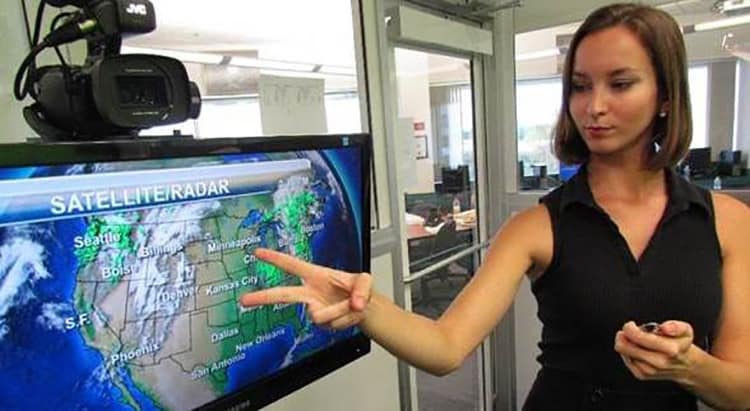
The Meteorology Broadcasting Studio provides an opportunity to learn about, practice and conduct research regarding various techniques for communicating complex scientific or technical information to diverse audiences. Topic areas include the graphical representation of scientific information, the spatial and temporal perception of displayed meteorological data, the effectiveness of different on-camera deliveries, the human response to hazardous-weather graphics and video editing techniques.
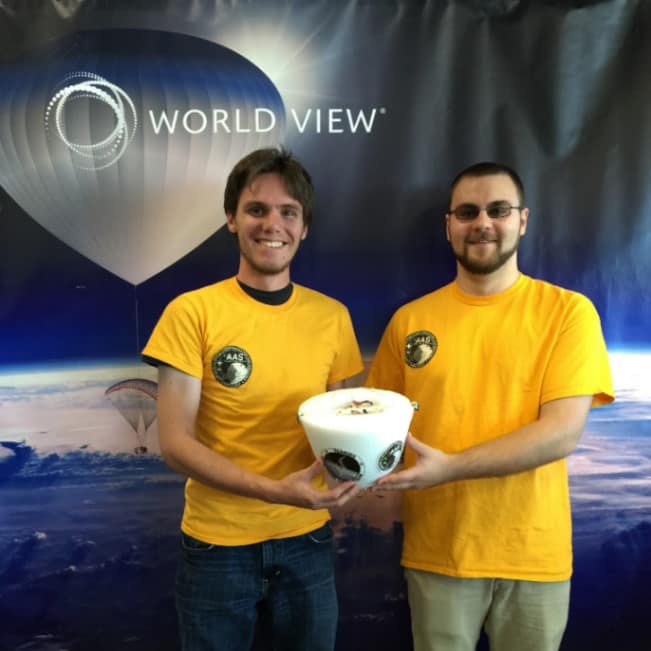
The mission of the PATO Lab is to provide development, operations, design integration and testing support for university space research payloads and instrumentation for suborbital and microgravity flights with national and international research platforms. Collaborative research efforts have focused on demonstrations of maturing technologies for sending several payloads since 2017 aboard Blue Origin’s New Shepard, NASA’s WB-57, and NASA/ZeroG parabolic research flights.
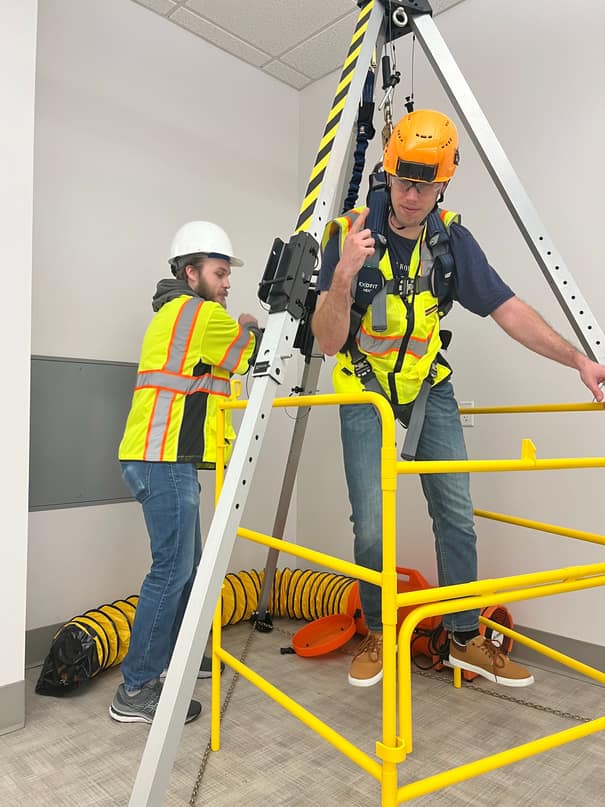
Speech and Language AI (SaLAI) Lab
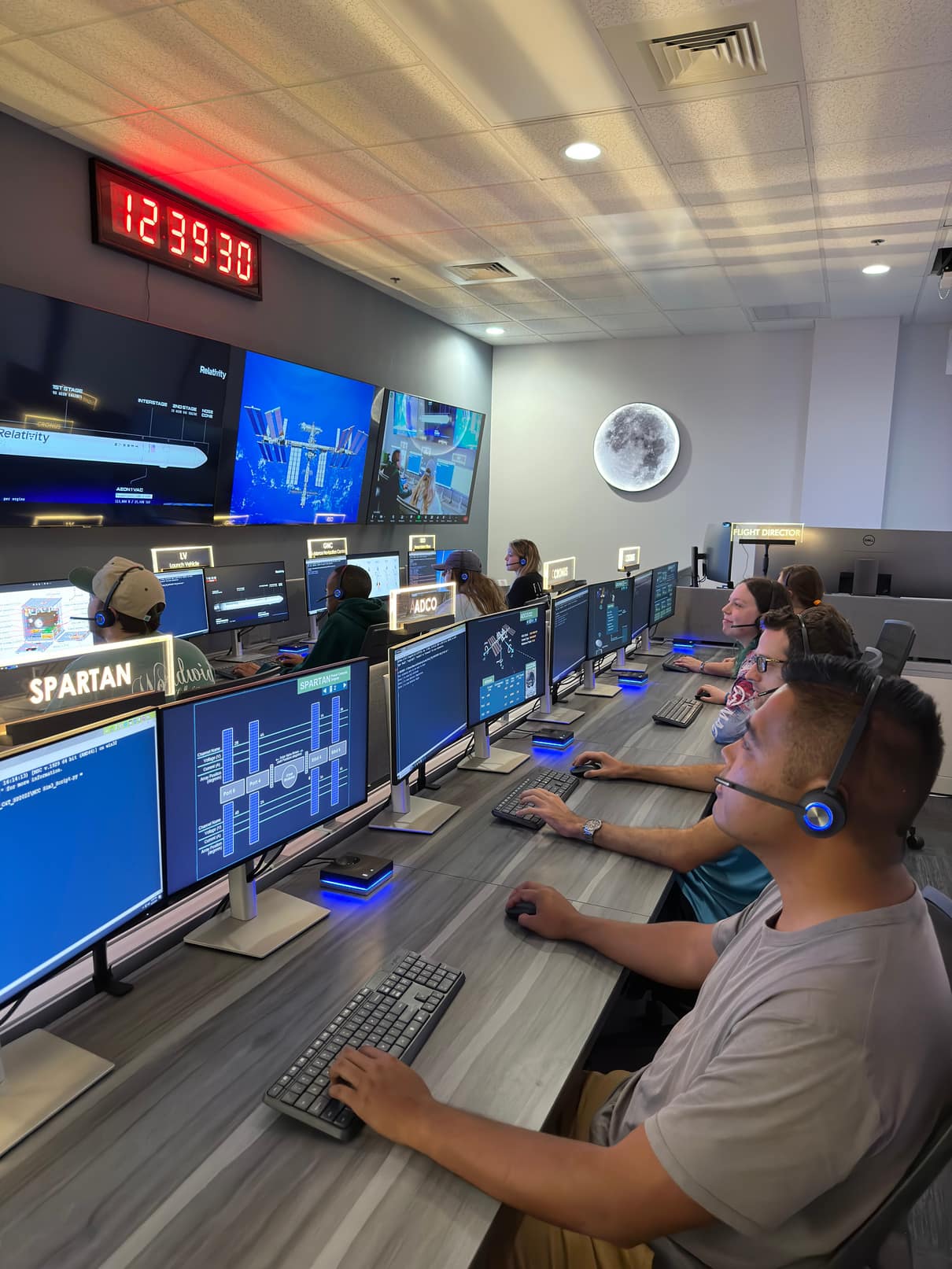
The Satellite Mission Control Center (MCC) provides a realistic, dynamic and exciting opportunity to study satellite mission operations as an interdisciplinary space flight team.
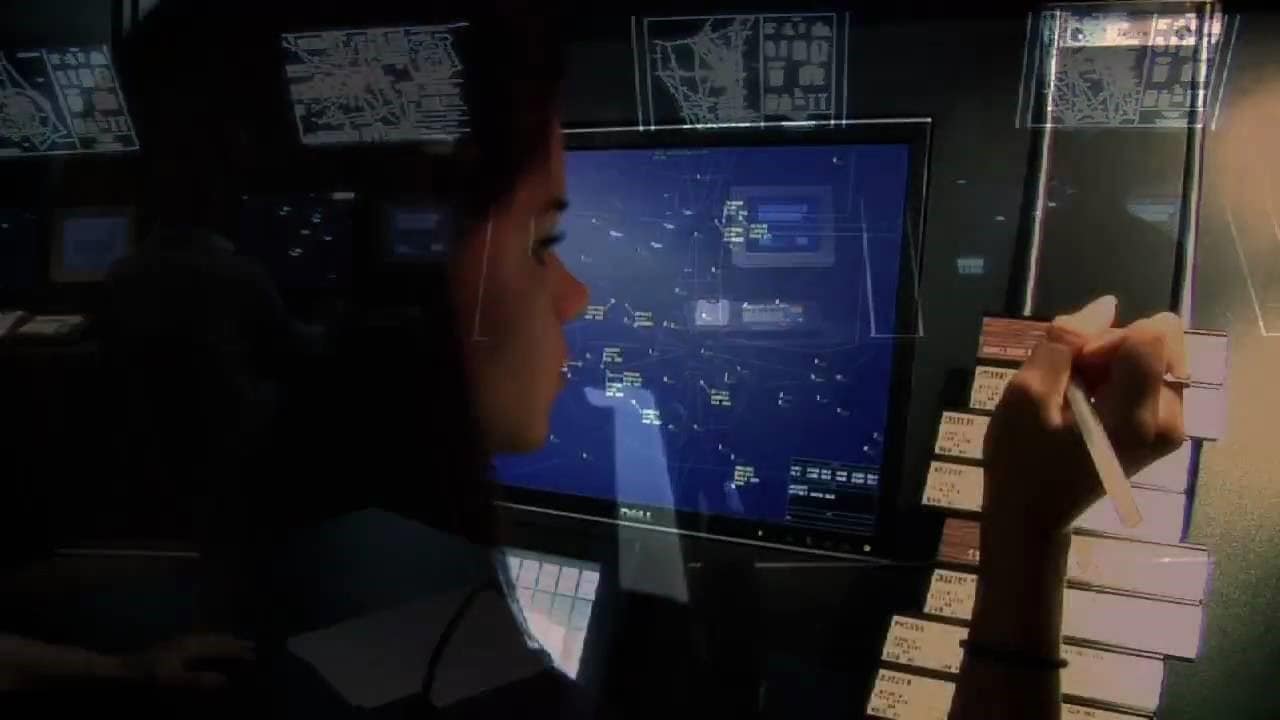
The TRACON Lab is a realistic simulation of the airspace around Academy Airport utilized at the FAA Air Traffic Training Academy. The lab integrates ATC interactions in all domains and includes the capability to simulate air traffic, radar and non-radar controlling actions, pseudo pilot control of aircraft and adjacent sectors and interphone communications. The TRACON Lab utilizes the FAA’s NEXTGEN Standard Terminal Automation Replacement System.
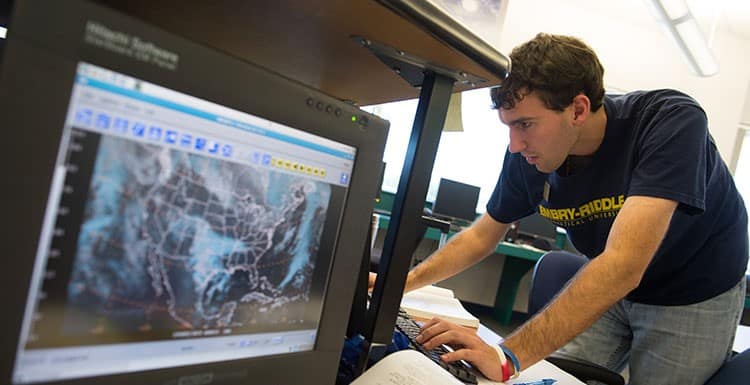
The Weather Center allows students to access weather data and analysis applications for lab assignments and student research products. The lab includes a NOAA Port satellite feed receiving over 1 Terabyte of worldwide weather data daily. It utilizes multiple weather analysis software packages for visually displaying and analyzing data and has a large-screen projection system for group discussions and briefings. Students can also access our weather servers to work with archived datasets for class and research projects.
Aviation Maintenance Science
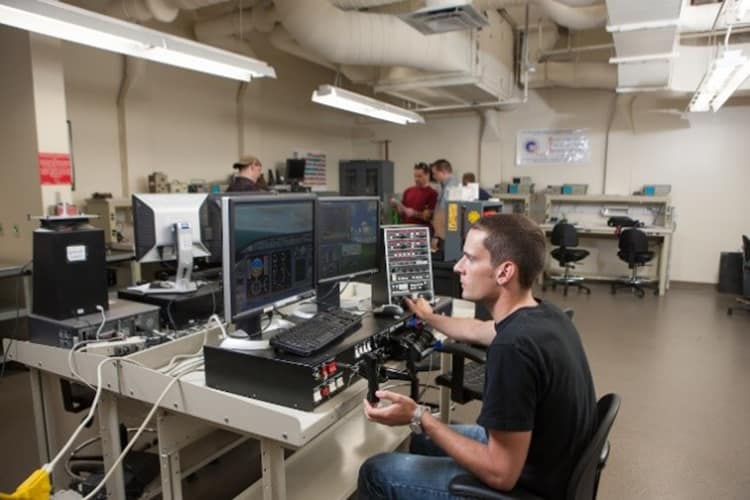
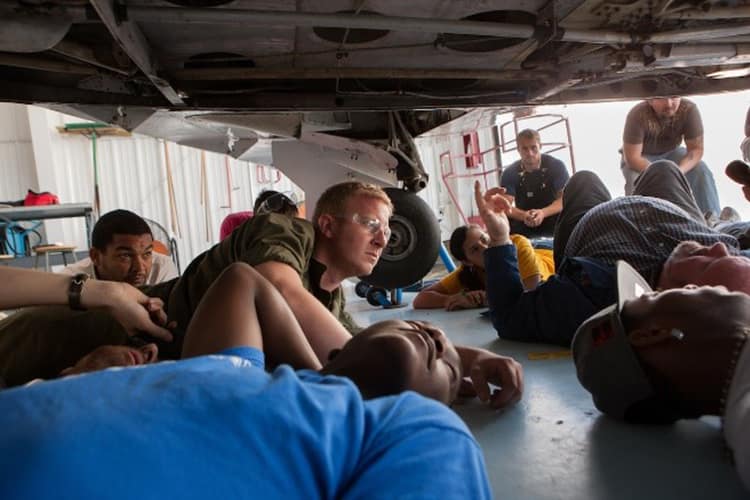
The AMS hangar has numerous functional engines from Lycoming, TCM, Austro and Pratt & Whitney, as well as test stands equipped with instrumentation. Additionally, the lab has an ACES system Probalancer Model 2020 for use with dynamic balance and spectrum analysis for propellers.
The Basic Engines and Propellers Lab is used to teach the concepts of engine theory of operation, design and construction and the theory and operation of aircraft propeller systems. The lab is equipped with various aircraft engines, reciprocating engine lubrication systems and fuel injection system mock-ups. The lab also has many types of fixed-pitch and constant-speed propellers.
The Avionics Lab contains equipment for general aviation, business, and commercial air transport aircraft avionics systems. Networking and wireless connectivity are also a major focus of the avionics lab. The lab incorporates projects for network configuration, management and troubleshooting of aircraft satellite communication, air-to-ground and cellular connectivity from safety to broadband solutions.
The Chandler Titus Engine Repair Station is a 3,000-square-foot shop that supports an FAA-certified repair station. This lab is fully equipped to inspect, overhaul and return aircraft engines to service.
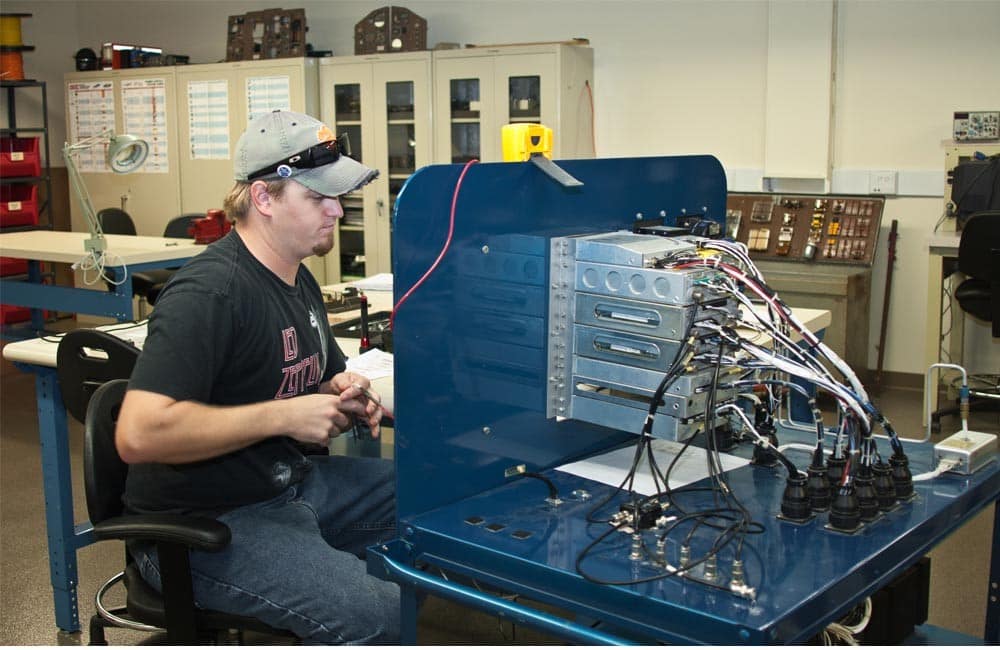
The Metallic Structures and Composites Lab is equipped to accommodate an extensive array of functions related to the fabrication and repair of aircraft metal and composite structures. The metallic structures portion has numerous common powered and hand tools for working with metal. Our composite capabilities include wet and prepreg layups and vacuum bagging. The lab also features tools and instruments for precision measuring, heat treatment and non-destruction testing.
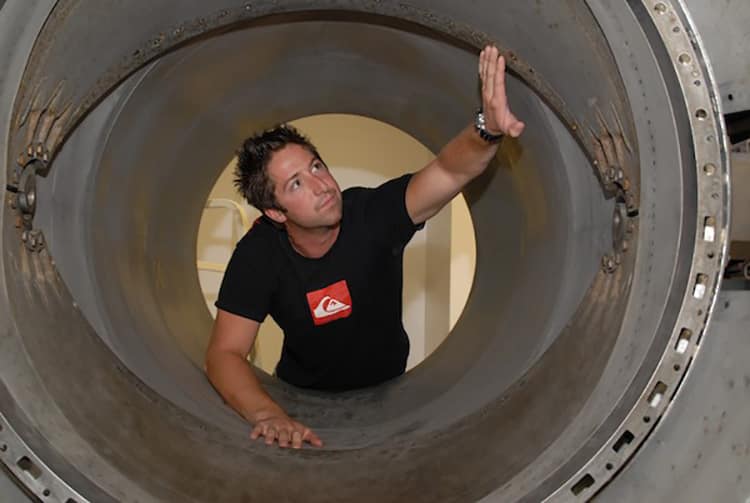
Flight
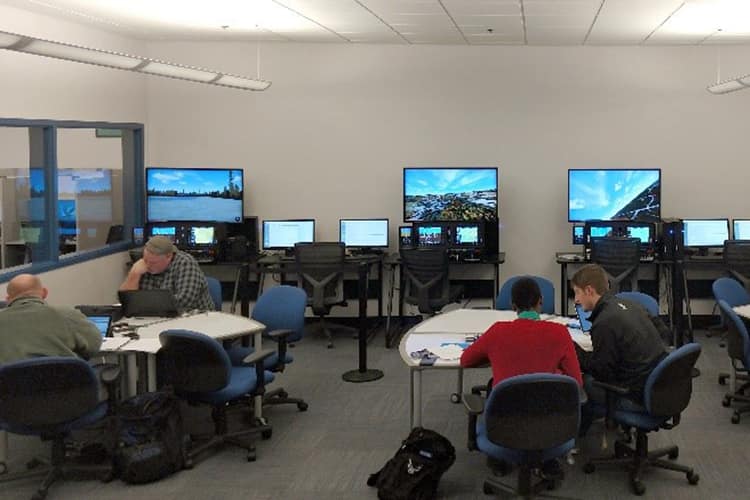
The ALC provides free tutoring primarily focusing on Aeronautical Science and Flight course-related topics. The ALC employs approximately 60 part-time ground flight instructors and offers access to ten ELITE model PI-1000 Advanced Aviation Training Devices (AATDs). These devices simulate the Garmin G1000 equipped Cessna 172S and Diamond DA-42 VI aircraft. The AATDs have 42-inch visual displays with real tactile feel and feedback when practicing flight maneuvers and instrument approaches. Along with the AATDs, the ALC can immerse students in Virtual Reality (VR) based interactive experiences for the private pilot check-ride and the Cessna 172S pre-flight.
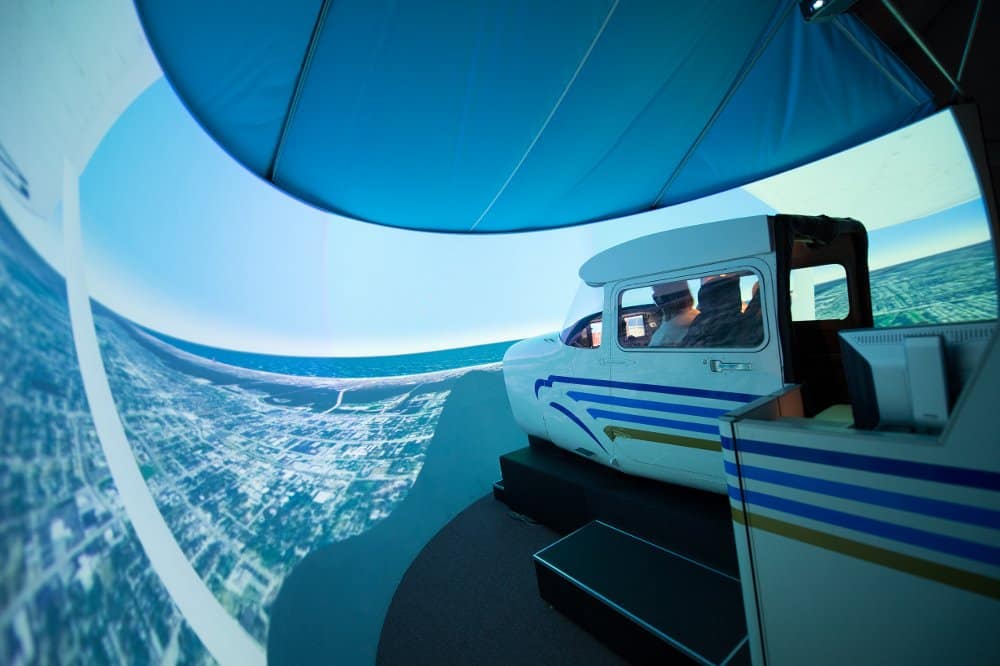
New-generation Flight Simulation Training Devices (FSTDs) are increasingly valuable in today’s complex flight training environment. To meet this need, the COA has an extensive fleet of FAA-certified FSTDs, including a Level D Full Flight Simulator (FFS), Level 5 and 6 Flight Training Devices (FTDs), Advanced Aviation Training Devices (AATDs) and Part Task Trainers (PTTs). All FTDs include panoramic visual systems capable of displaying geo-specific scenery on a 220-degree horizontal by 60-degree vertical field-of-view spherical dome. The CRJ200 FSTD fleet includes virtual visual systems capable of providing depth perception during the taxi, take-off, approach and landing phases of flight. These sophisticated training devices enable students to master aircraft performance, practice cockpit resource management, experience aerodynamic effects, and perform a variety of high-risk flight maneuvers safely in a controlled environment.
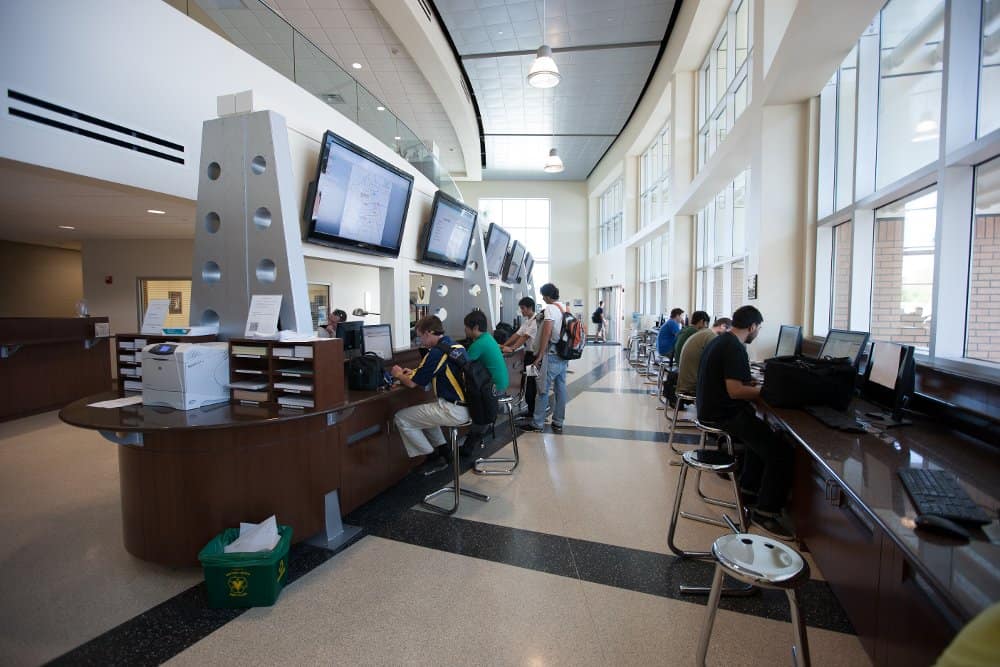

The Preflight Immersion Lab houses the Immersive Training Devices (ITD) and Procedures Trainers. For the Operations Training course, students will spend two hours a day in the lab during Stage 1 of their training. Students also spend one hour in a virtual reality flight simulator where they complete training scenarios to practice their flight skills and build proficiency. Students spend 30 minutes learning how to preflight an aircraft and complete all checklists in our Procedures Trainer while in virtual reality. Finally, students spend 30 minutes experiencing and learning air traffic control radio transmissions and phraseology in our Procedure Trainers while in virtual reality.
School of Graduate Studies
Aerospace Human-Centered Innovation Hub
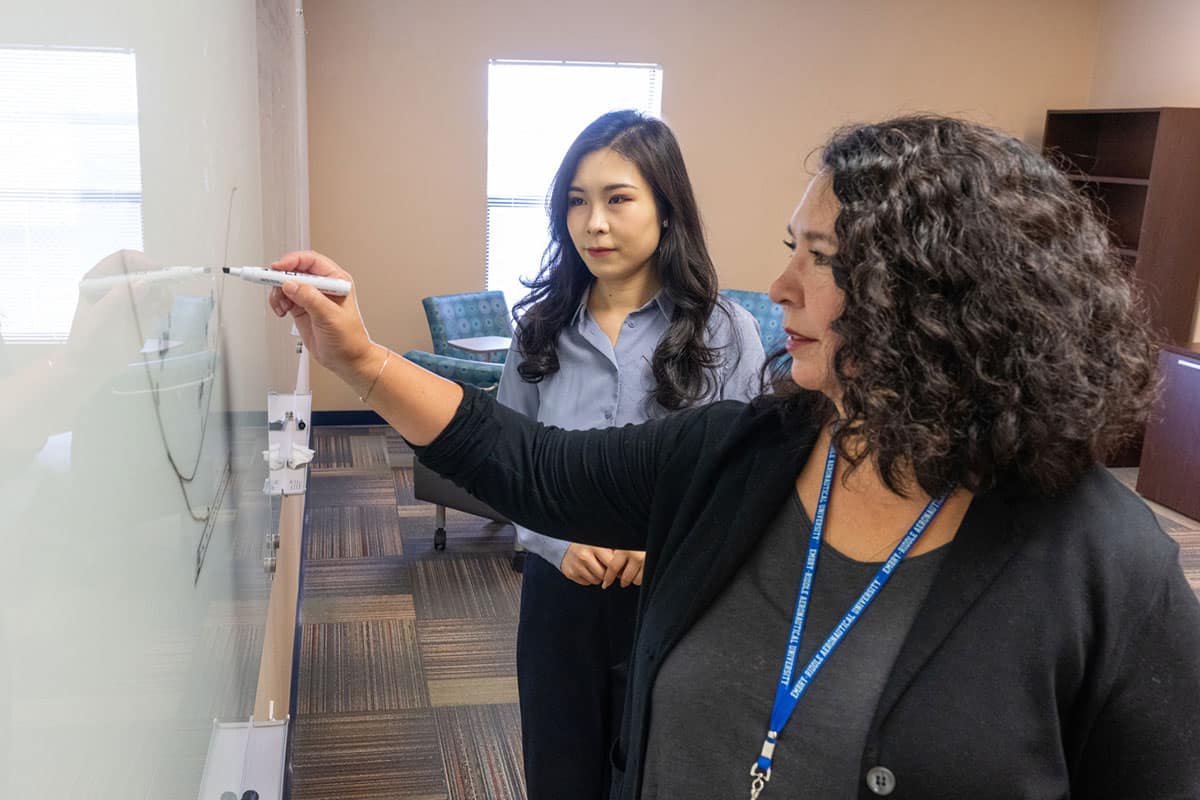
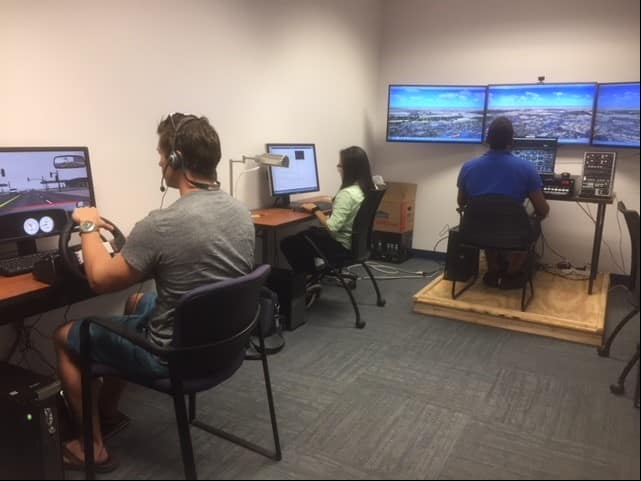
The CERTS Lab conducts research in human factors, human performance, training, attentional allocation, fatigue, situation awareness, adaptive automation, virtual reality and intentional insensitivity. The mission of the CERTS Lab is to enhance the interaction of personnel, technology and the environment in transportation systems through basic and applied research.
